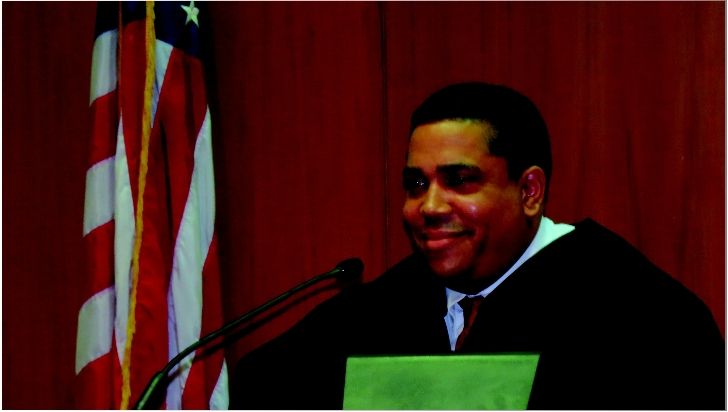Toll lane to close Thursday
January 28, 2015
HEART OVER HYPE
January 29, 2015Lawyers who brought a federal Voting Rights Act suit claiming Terrebonne Parish’s manner of electing judges runs afoul of the law are questioning state and local officials under oath about their knowledge of and roles in failed efforts to create a minority judicial district.
State Reps. Gordon Dove (R-Houma), Joe Harrison (R-Napoleonville) and former Reps. Damon Baldone and Hunt Downer Jr. gave depositions the first week of January. Much of the questioning concerned failed legislation sponsored by Rep. Dalton Honore (D-Baton Rouge) in 2011, which would have created a special district with a majority black electorate in Terrebonne Parish, increasing the odds that a black judicial candidate could be elected.
Honore was deposed as well.
All five judges in the 32nd Judicial District, which serves all of Terrebonne Parish, are elected parish-wide. A suit brought before the U.S. District Court in Baton Rouge on behalf of the NAACP’s Terrebonne branch alleges the practice violates the Voting Rights Act, because it prevents minority voters from electing candidates of their choice.
The historical record, attorneys for the New York-based NAACP Legal Defense Fund charge, shows that local black people vote as a block, that judicial candidates who might be favored by black people voting as a bloc have never been able to win the bench, and that this is because the majority white electorate does not tend to vote for them.
The attorneys, whose organization is a separate entity from the NAACP itself, propose a minority sub-district – what they call an “opportunity district” – which would give black voters equal footing in electing a judge of their choice.
Opponents of such measures say they are not necessary to ensure fair choices. They point to the seating of newly-elected State District Court Judge Juan Pickett to the Terrebonne bench as proof that a black candidate can be successful.
The attorneys counter the issue is not whether a black, Hispanic or Native American judge can be elected, but whether any judge running is the choice of black voters in a concentrated area, and whether the current system allows their voices to be heard effectively at the polls.
Pickett ran unopposed for the bench vacated by Judge Timothy Ellender, who retired due to Louisiana’s mandated age restrictions.
Leah Aden, lead attorney on the LDF team, said Pickett’s ascension from assistant district attorney to judge is not an indication that the 32nd District is compliant with the Voting Rights Act.
“The election of Juan Pickett gives little weight to the argument that they are not; judges know that is one strategy that the states use to defeat Voting Rights Act claims,” Aden said in a telephone interview.
“This is not the first runaround of this type and other cases have had minority candidates elected during the pendency of litigation. This should not get in the way of the plaintiffs’ ability to prove their case. There is plenty of case-law to support that this does not end things.”
Some of the officials questioned during Aden’s visit to Houma earlier this month differ with the LDF attorney’s assessment. The periods during which a qualified black candidate cannot attain the bench or any other office, they say, are long gone.
Questioned about his deposition Dove, who has announced that he is running next year for Terrebonne Parish President, said he expressed faith in the current method of selecting judges, and that Pickett’s judgeship is proof positive.
“We have a minority judge that was elected to the 32nd Judicial District, in Division C,” Dove said. “His name is Juan Pickett, now Judge Juan Pickett. I was a supporter of his and he ran unopposed, therefore duly elected by the people of Terrebonne Parish.”
The deposition, Dove said, lasted about two hours.
“It wasn’t a real fast deposition,” the state representative said. “The attorneys were very courteous. And my whole testimony was that Terrebonne Parish has a minority judge and so I believe the lawsuit is moot. Juan Pickett is a well-qualified judge who was in the DA’s office for 18 years.
When nobody runs against you it means the people are happy with you. Even so, Juan Pickett, he went door to door. The people respect the guy and I supported him 100 percent and I look forward to him serving as a judge.”
Harrison gave similar testimony, noting that during his political career he has easily carried majority-black precincts. A special district is not needed, he maintains, to see that a qualified candidate who is the people’s choice will be elected. Harrison originally supported the 2011 bill but an amendment authored by Baldone with specific district lines earned his opposition by the time it came to a full floor vote.
The 2011 bill failed by a 51-40 vote, with the Terrebonne delegation split. The bill – anticipating the mandatory retirement of Ellender – would have designated his division as subject solely to a minority sub-district vote. The special district would have extended from a portion of Houma
to Bayou Blue, in Terrebonne’s northeastern quadrant. A second judge would have been selected by voters in the other election districts. The remaining three divisions of court as well as Houma City Court would have judges selected by the entire electorate.
The second district – comprised of the entire parish except for the minority sub-district – would have created a “super-white” district in the opinion of Dove, who was vociferous in his public opposition of the bill.
Baldone had said the Honore bill had the support of the Terrebonne Parish Council. Some council members – like Harrison – balked, however, when the district lines were included.
“It went OK but I don’t know if they got a lot out of my deposition,” Baldone said. “I did say that public officials supported my legislation, and at every Martin Luther King Jr. event every legislator was asked, ‘Do you support this.’ When it came down to the vote a lot of them didn’t.”
The bill, although conceived by Baldone, was authored and presented by Honore because the Terrebonne legislator already had reached his limit of permitted bills that session.
“It made sense. There was a need for it. The numbers supported it,” Baldone said of the minority sub-district in an interview last week.
The current federal case is moving slowly forward, with deadlines for various motions continuing through next year.
The suit does not name any Terrebonne officials. The defendants are Piyush “Bobby” Jindal, in his official capacity as governor; James “Buddy” Caldwell, as state attorney general, and Secretary of State Tom Schedler.
It was brought by the Terrebonne NAACP, the Rev. Vincent Fusilier Sr. and fellow Terrebonne residents Lionel Myers, Wendell Desmond Shelby Jr. and Daniel Turner.
Senior Judge James Joseph Brady, appointed to the federal bench in 1999 by President Bill Clinton, is presiding over the case.
The concept of special districts to ensure that minority voters will have an equal voice in the system is not new to Louisiana; two districts of the Terrebonne Parish Council were drawn to accommodate the same provisions of the Voting Rights Act. Similarly, judicial districts elsewhere in the state serve this purpose.
“One can only look around the state of Louisiana to know that very few, if any, blacks serving in the state House or Senate or the state Supreme Court have ever been elected from a majority white population,” Aden said. “The only avenue of opportunity has been through district based voting, and that record is clear in Terrebonne and other parishes.”
Judge Pickett himself maintains – as do supporters black and white – that his elevation to the bench has been made on merit, and that his place there is the result of a lifetime centered on that specific goal. E3
District Judge Juan Pickett sits behind the bench in the former Division C courtroom for the first time after his swearing in ceremony.
MAACP President Jerome Boykin congratulates District Judge Juan Pickett at Martin Luther King program but stresses mportance of lawsuit to change how judgss are chosen.










